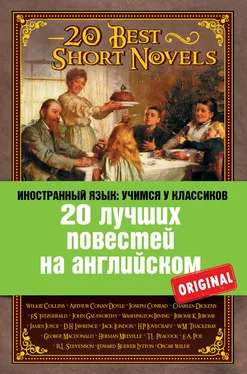MR. FLOSKY
The false knave, sir, is my honest friend; therefore, I beseech you, let him be countenanced. God forbid but a knave should have some countenance at his friend’s request.
MR. TOOBAD
‘Good men and true’ was their common term, like the kalos kagathos [647]of the Athenians [648]. It is so long since men have been either good or true, that it is to be questioned which is most obsolete, the fact or the phraseology.
MR. CYPRESS
There is no worth nor beauty but in the mind’s idea. Love sows the wind and reaps the whirlwind. Confusion, thrice confounded, is the portion of him who rests even for an instant on that most brittle of reeds – the affection of a human being. The sum of our social destiny is to inflict or to endure.
MR. HILARY
Rather to bear and forbear, Mr. Cypress – a maxim which you perhaps despise. Ideal beauty is not the mind’s creation: it is real beauty, refined and purified in the mind’s alembic, from the alloy which always more or less accompanies it in our mixed and imperfect nature. But still the gold exists in a very ample degree. To expect too much is a disease in the expectant, for which human nature is not responsible; and, in the common name of humanity, I protest against these false and mischievous ravings. To rail against humanity for not being abstract perfection, and against human love for not realising all the splendid visions of the poets of chivalry, is to rail at the summer for not being all sunshine, and at the rose for not being always in bloom.
MR. CYPRESS
Human love! Love is not an inhabitant of the earth. We worship him as the Athenians did their unknown God: but broken hearts are the martyrs of his faith, and the eye shall never see the form which phantasy paints, and which passion pursues through paths of delusive beauty, among flowers whose odours are agonies, and trees whose gums are poison.
MR. HILARY
You talk like a Rosicrucian [649], who will love nothing but a sylph [650], who does not believe in the existence of a sylph, and who yet quarrels with the whole universe for not containing a sylph.
MR. CYPRESS
The mind is diseased of its own beauty, and fevers into false creation. The forms which the sculptor’s soul has seized exist only in himself.
MR. FLOSKY
Permit me to discept. They are the mediums of common forms combined and arranged into a common standard. The ideal beauty of the Helen [651]of Zeuxis [652]was the combined medium of the real beauty of the virgins of Crotona [653].
MR. HILARY
But to make ideal beauty the shadow in the water, and, like the dog in the fable, to throw away the substance in catching at the shadow, is scarcely the characteristic of wisdom, whatever it may be of genius. To reconcile man as he is to the world as it is, to preserve and improve all that is good, and destroy or alleviate all that is evil, in physical and moral nature – have been the hope and aim of the greatest teachers and ornaments of our species. I will say, too, that the highest wisdom and the highest genius have been invariably accompanied with cheerfulness. We have sufficient proofs on record that Shakspeare and Socrates were the most festive of companions. But now the little wisdom and genius we have seem to be entering into a conspiracy against cheerfulness.
MR. TOOBAD
How can we be cheerful with the devil among us?
THE HONOURABLE MR. LISTLESS
How can we be cheerful when our nerves are shattered?
MR. FLOSKY
How can we be cheerful when we are surrounded by a reading public, that is growing too wise for its betters?
SCYTHROP
How can we be cheerful when our great general designs are crossed every moment by our little particular passions?
MR. CYPRESS
How can we be cheerful in the midst of disappointment and despair?
MR. GLOWRY
Let us all be unhappy together.
MR. HILARY
Let us sing a catch.
MR. GLOWRY
No: a nice tragical ballad. The Norfolk Tragedy to the tune of the Hundredth Psalm.
MR. HILARY
I say a catch.
MR. GLOWRY
I say no. A song from Mr. Cypress.
ALL
A song from Mr. Cypress.
MR. CYPRESS sung —
There is a fever of the spirit,
The brand of Cain’s unresting doom,
Which in the lone dark souls that bear it
Glows like the lamp in Tullia’s [654]tomb:
Unlike that lamp, its subtle fire
Burns, blasts, consumes its cell, the heart,
Till, one by one, hope, joy, desire,
Like dreams of shadowy smoke depart.
When hope, love, life itself, are only
Dust – spectral memories – dead and cold —
The unfed fire burns bright and lonely,
Like that undying lamp of old:
And by that drear illumination,
Till time its clay-built home has rent,
Thought broods on feeling’s desolation —
The soul is its own monument.
MR. GLOWRY
Admirable. Let us all be unhappy together.
MR. HILARY
Now, I say again, a catch.
THE REVEREND MR. LARYNX
I am for you.
MR. HILARY
‘Seamen three.’
THE REVEREND MR. LARYNX
Agreed. I’ll be Harry Gill, with the voice of three. Begin.
MR. HILARY AND THE REVEREND MR. LARYNX
S eamen three! What men be ye?
Gotham’s three wise men we be.
Whither in your bowl so free?
To rake the moon from out the sea.
The bowl goes trim. The moon doth shine.
And our ballast is oldwine;
And your ballast is old wine.
Who art thou, so fast adrift?
I am he they call Old Care.
Here on board we will thee lift.
No: I may not enter there.
Wherefore so? ‘Tis Jove’s decree,
In a bowl Care may not be;
In a bowl Care may not be.
Fear ye not the waves that roll?
No: in charmed bowl we swim.
What the charm that floats the bowl?
Water may not pass the brim.
The bowl goes trim. The moon doth shine.
And our ballast is old wine;
And your ballast is old wine.
This catch was so well executed by the spirit and science of Mr. Hilary, and the deep tri-une voice of the reverend gentleman, that the whole party, in spite of themselves, caught the contagion, and joined in chorus at the conclusion, each raising a bumper to his lips:
The bowl goes trim: the moon doth shine:
And our ballast is old wine.
Mr. Cypress, having his ballast on board, stepped, the same evening, into his bowl, or travelling chariot, and departed to rake seas and rivers, lakes and canals, for the moon of ideal beauty.
It was the custom of the Honourable Mr. Listless, on adjourning from the bottle to the ladies, to retire for a few moments to make a second toilette, that he might present himself in becoming taste. Fatout, attending as usual, appeared with a countenance of great dismay, and informed his master that he had just ascertained that the abbey was haunted. Mr. Hilary’s gentlewoman , for whom Fatout had lately conceived a tendresse [655], had been, as she expressed it, ‘fritted out of her seventeen senses’ the preceding night, as she was retiring to her bedchamber, by a ghastly figure which she had met stalking along one of the galleries, wrapped in a white shroud, with a bloody turban on its head. She had fainted away with fear; and, when she recovered, she found herself in the dark, and the figure was gone. ‘ Sacre – cochon – bleu! ’ [656]exclaimed Fatout, giving very deliberate emphasis to every portion of his terrible oath ‘I vould not meet de revenant , de ghost – non – not for all de bowl-de-ponch in de vorld.’
‘Fatout,’ said the Honourable Mr. Listless, ‘did I ever see a ghost?’
‘ Jamais [657], monsieur, never.’
Читать дальше
Конец ознакомительного отрывка
Купить книгу












